Advertisement
Sobriety Rules At Mass. Homeless Shelters Lead Some Seeking Help To Keep Moving
Resume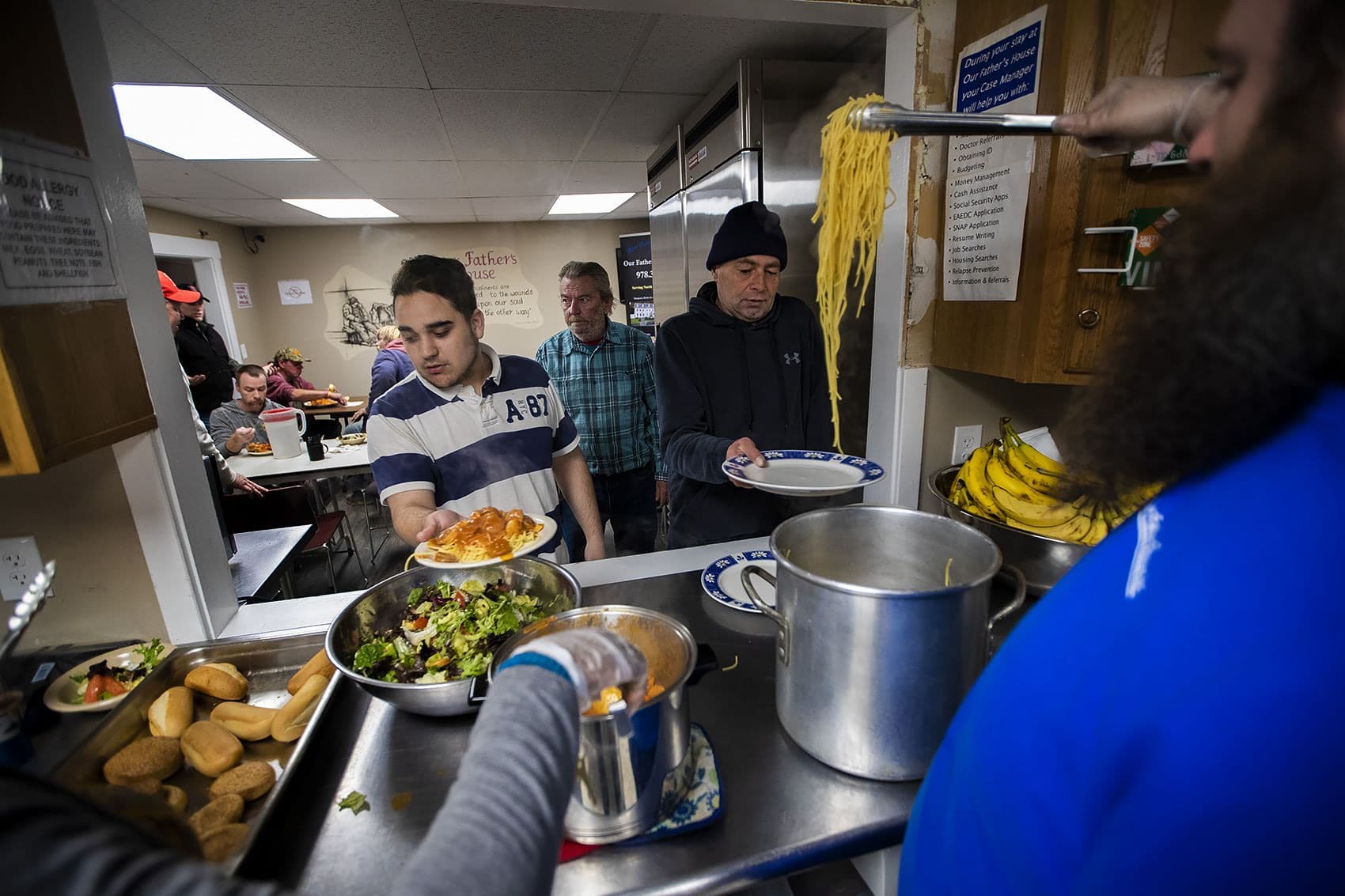
Part two of a four-part series. Here's part one.
It's 5:30 on a frigid afternoon in Fitchburg. Men and women are streaming into the cramped entryway of the city's only emergency homeless shelter for adults, Our Father's House.
"Nice to have a warm place instead of being out in the cold," one man says. "It's very cold. Very, very cold."
A staff member scans each person with a metal detector wand. He looks in the tops of their socks to make sure they don't have any drugs or weapons.
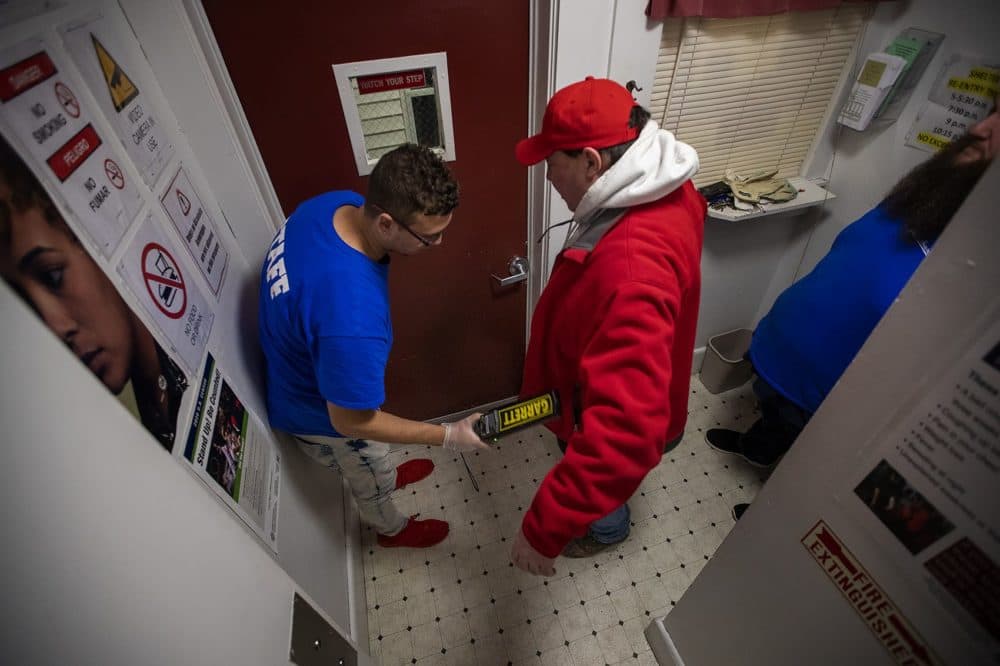
Shelter guests don't seem to mind — it's part of their routine. They banter with the shelter workers.
The workers are also looking for signs that the people coming to stay are under the influence of drugs or alcohol. Our Father's House is a sober shelter.
"I did smell alcohol on a guy that came to the door," says Kevin MacLean, the organization's director of homeless services. "He always says he's not drinking, but I know he is. We'll follow our policy and procedure, sit down and talk to him, and if he's at the point that he needs some help, we'll get him some help."
If someone appears to be under the influence, MacLean says shelter workers will have the person blow into a breathalyzer. They'll also do a six-panel urine test for drugs — which gives results on the spot.
MacLean often offers to personally drive someone to detox if the person wants to go. He points out Our Father's House isn't expecting total sobriety. While administrators want someone to be sober for 24 hours before staying here, there is some flexibility.
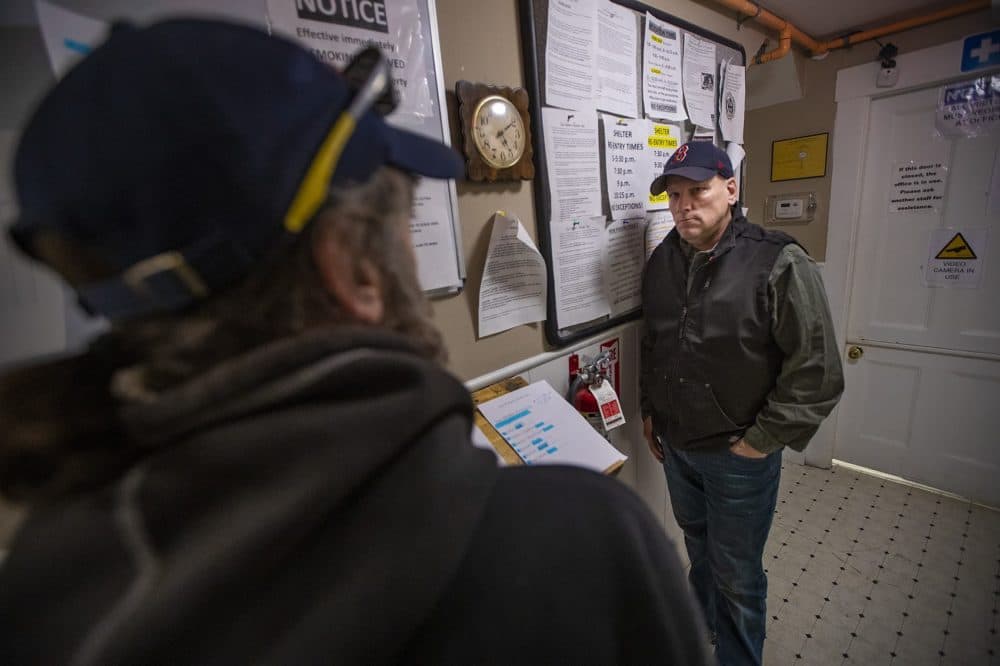
Forty-three-year-old Jason Poudrier recently blew a .07 on the breathalyzer. Shelter staff gave him time to sober up.
"They just asked me to leave until 7:30 at night, come back ... shower, go right into my room," he explains, "... so I don't trigger nobody."
Our Father's House leaders say some people with alcoholism or other substance use disorders would be triggered by eating or sleeping next to someone who is visibly under the influence or smells of alcohol.
Each case is a judgment call, they say. They might allow a person to stay because of bad weather, or because of the person's circumstances. Maybe someone has just gone through a tough loss and had a couple of drinks, for example.
But there are times Our Father's House decides someone can't stay.
"There's always a resource for somebody. ... We do give them resources of other shelters ... Pine Street Inn [and the] shelter in Worcester," MacLean explains. "I haven't had anybody that has come to me under the influence and then slept outside."
The shelter works to connect people with family members who will put them up. And, MacLean says, there are a couple of members of a local church who will take people into their homes for the night, no matter their condition.
'Pushing Vulnerable People To Different Places'
For leaders of Pine Street Inn in Boston, seeing other shelters tell people they have to leave is a concern.
"Saying to people you can't come in the front door when our goal is to get those folks into treatment obviously doesn't work," says Lyndia Downie, Pine Street Inn's president and executive director.
"You can't get people into treatment if you can't start a dialogue and build some trust with them," she adds.
Downie stresses she does not want to take issue with any specific shelter or its policies.
Pine Street Inn is a so-called "wet" shelter. It takes people in any condition — even intoxicated — as long as they're under control and appear to be safe. They aren't allowed to bring in alcohol or drugs.
Out of 39 emergency homeless shelters for adults in Massachusetts that are funded by the state, 18 are wet shelters. That's according to information provided by the Massachusetts Department of Housing and Community Development.
"It doesn't make sense to me to have programs that are intended to help the most vulnerable people, then have these types of rules layered on top," says Laila Bernstein, adviser to the mayor for Boston's Initiative to End Chronic Homelessness. "It means you're missing some of the people who need you the most."
Boston officials say their data show that more than half of the people using adult emergency homeless shelters in the city came from someplace else; they last had a permanent residence in a city or town other than Boston. Bernstein says rules at some shelters outside the city that bar certain people are one of the driving forces in the migration.
Out of 39 emergency homeless shelters for adults in Massachusetts that are funded by the state, 18 are wet shelters.
"That's not ending homelessness," Bernstein says. "That's bouncing people around and pushing vulnerable people to different places ... which is problematic — not just because we're seeing such a massive inflow of people [that] it's hard for us to make progress on our overall numbers — but also for the individuals themselves. Leaving your natural network just increases the risk that you're going to be homeless longer and have a harder time regaining stability."
City leaders and shelter providers in Boston say though overall chronic homelessness has declined 19% in the city over the last four years, the number of adults in shelter has remained pretty consistent — partly because of the inflow from other places.
The 'Value' Of Sober Shelters
Some homeless service providers say it makes sense to have some shelters with restrictions.
"Sometimes you can see that there's value in having a sober shelter area for somebody who needs to be in a sober support environment," says Susan Gentile, chief program officer at South Middlesex Opportunity Council (SMOC). "So I think people try to have an open mind among the varied providers."
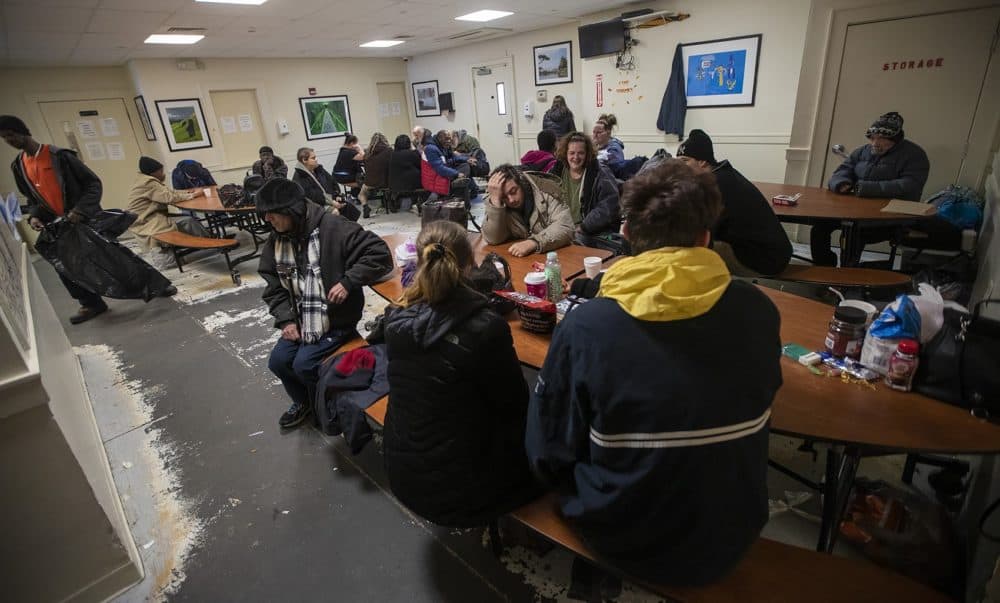
SMOC runs emergency homeless shelters for adults in Ashland, Framingham, Marlboro, Worcester and Lowell. Most of them require sobriety. But the Worcester facility is the county's only wet shelter. It takes in pretty much everyone — as long as they're from Worcester County.
Back at Our Father's House in Fitchburg, men are playing cribbage as staff members prepare a dinner of pasta, sausage and salad.
John Gonzalez has been staying at the shelter for about three months. It's his first time experiencing homelessness. He says at this point, it isn't important for him to be at a shelter that requires sobriety; he's been clean and sober for 15 years after a battle with drug addiction.
Gonzalez says not only would he have been OK at a shelter that allows people who are under the influence, but he feels he'd have something to offer others.
"I like to give a lot of my advice of the struggles I've been through, and I talk to people and reach out to people," Gonzalez says.
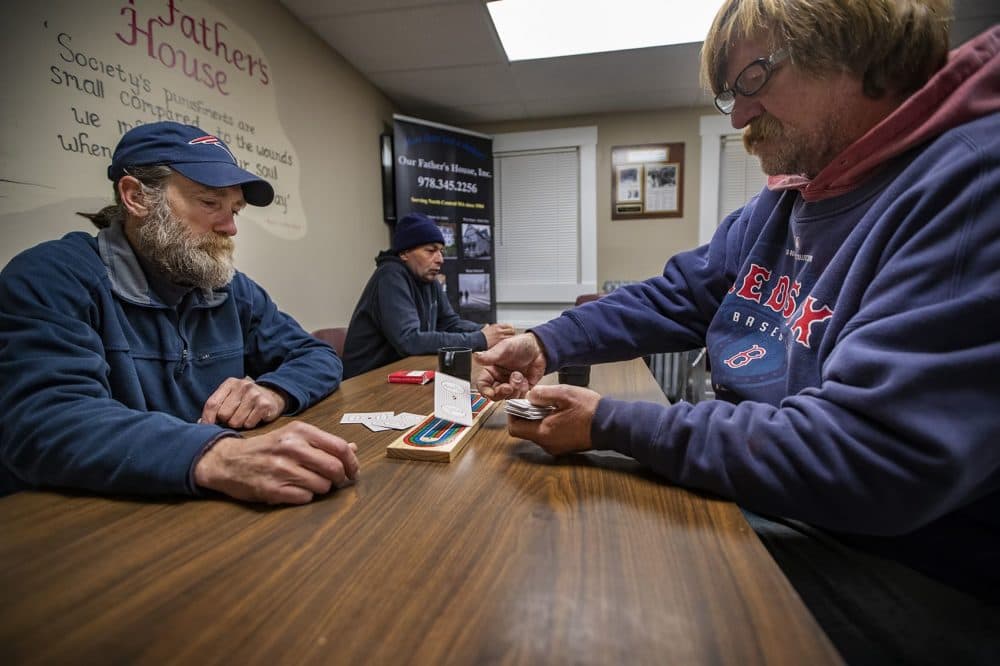
Another shelter guest, Karen Dunbar, says until recently, she would not have been able to stay around others who'd been drinking because of her history with alcohol use. She appreciates the discipline of Our Father's House.
"I think without rules and structure, we wouldn't be getting along here," Dunbar says. "Without the rules that Kevin [MacLean] and them lay down, this place would be run like a zoo."
Our Father's House looked into adding what it calls a "wet wing." But MacLean says it would have cost too much. It would've required nursing staff and additional security. He says administrators also decided it would be too big a departure from the organization's longstanding philosophy around sobriety. And since the shelter is in a residential area, it would be difficult to allow people who are intoxicated and remain a "good neighbor," he says.
Our Father's House also does not allow registered sex offenders. Some other shelters do.
"So we're not the shelter for everyone," MacLean says. "Best way to put it. We're not the shelter for everyone."
Like some others, Our Father's House has a residency requirement; it serves people from a 31-town area. It doesn't only give them shelter and meals — MacLean uses government funding to find permanent housing for clients.
Bernstein, with the city of Boston, says the residency rule is the shelter restriction she understands the most.
"In some ways they're trying to say, 'Look, we have a need in our community and we're trying to meet that need,' " she says. "... But it then does put a burden on a system that doesn't have that kind of restriction."
Shelter providers in Boston and around Massachusetts are talking with the state about shelter funding, capacity and rules. They're hoping for a more balanced system for serving people who don't have homes and are looking for help.
This segment aired on February 6, 2020.
